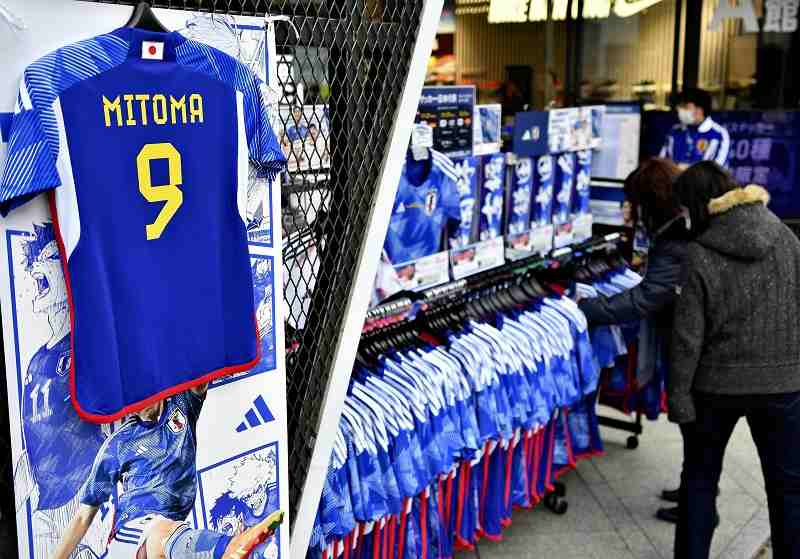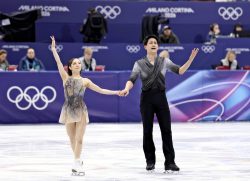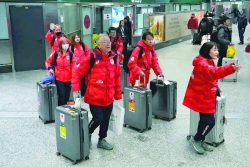
National soccer team jerseys are on display at the Super Sports Xebio Tokyo Ochanomizu store in Chiyoda Ward, Tokyo, on Friday.
11:54 JST, December 4, 2022
The impressive performance by the Japan national soccer team at the FIFA World Cup in Qatar is providing a tidy boost to the economy as tournament-related goods like clothing are flying off the shelf.
Sales of national team jerseys have been 10 times above average at some sporting goods stores. Meanwhile, some estimate that the economic impact of the team having advanced into the knockout round is worth ¥16.3 billion in Japan.
On Friday, after Japan’s victory over Spain — one of the favorites to win the championship — customers came one after another to the Super Sports Xebio Tokyo Ochanomizu store in Chiyoda Ward, Tokyo, to buy some national team kit.
A 40-year-old company executive from Chiba bought jerseys for his family of four. “I was so moved by Japan’s victory over Spain that I came here to buy these,” he said with a smile.
At the sporting goods store Alpen Tokyo in Shinjuku Ward, Tokyo, more than 50 uniform shirts were sold Friday morning alone. This was about 10 times the number sold in the morning on each of the previous days.
“The more the national team wins, the more related goods are sold,” said a person in charge at the store.
The team’s wins in the World Cup have also caused a ripple effect on the sales of food and drink. Coca-Cola (Japan) Co., which sells limited edition World Cup-labeled products, saw “a significant increase in the shipments in November due to the World Cup effect,” said an official in charge at the company.
At Pizza Hut Japan Ltd., its sales on the days when the national team’s first and second World Cup games were held were about 1.7 times higher than on the corresponding days a year earlier.
Pizza Hut expects the day’s orders to be “double the normal level” when Japan plays Croatia early Tuesday, a public relations official at the company said.
Toshihiro Nagahama, a chief economist at the Dai-ichi Life Research Institute, estimates that the economic effect in Japan of the FIFA World Cup has amounted to ¥11.1 billion for soccer-related items and ¥5.2 billion for food and beverage items. He said that although this is less than the ¥21.5 billion generated by the previous World Cup in Russia, the effect will be even greater if the team advanced into the quarterfinals.
Cup-related stocks rise across board
The excitement over the FIFA World Cup in Qatar has spread to the stock market as well. Although a wide range of stocks fell in price on the Tokyo Stock Exchange on Friday, prices of World Cup-related stocks rose across the board.
HUB Co., which operates British pub-style HUB restaurants and has been showing televised World Cup games, was flooded with buy orders from the start of the day’s trading Friday. At around 9:45 a.m., HUB shares hit ¥769, up ¥100 from the previous day’s closing price, the maximum allowable single-day gain. The share price finished the day at ¥716, up ¥47.
Shares of CyberAgent, Inc., an IT giant that owns AbemaTV, an internet station broadcasting live all 64 World Cup matches, temporarily rose more than 7% from the previous day’s closing price. Expectations for the expansion of AbemaTV’s business seemed to have grown. Shares of sporting goods retailers Xebio Holdings Co. and Alpen Co. briefly rose more than 2%.
Stocks related to the World Cup soared on Nov. 24, the day following Japan’s upset victory over the powerful German team, and then moved downward on Nov. 28, the day following Japan’s loss to Costa Rica.
Top Articles in Sports
-

Milano Cortina 2026: Figure Skaters Riku Miura, Ryuichi Kihara Pair Win Gold; Dramatic Comeback from 5th Place in SP
-

Milano Cortina 2026: Kokomo Murase Comes Out on Top After Overcoming Obstacles, Aiming for Greater Heights in Competition
-

Milano Cortina 2026: Riku Miura, Ryuichi Kihara Clinch Japan’s 1st Gold in Pairs Figure Skating, Rebounding from Disappointing Short Program
-

Milano Cortina 2026: Olympics-Torch Arrives in Co-Host Cortina on Anniversary of 1956 Games
-

Milano Cortina 2026: Japan’s Athletes Arrive in Italy for Milano Cortina Winter Olympics; Other Athletes to Arrive from Now
JN ACCESS RANKING
-

Japan PM Takaichi’s Cabinet Resigns en Masse
-

Japan Institute to Use Domestic Commercial Optical Lattice Clock to Set Japan Standard Time
-

Israeli Ambassador to Japan Speaks about Japan’s Role in the Reconstruction of Gaza
-

Man Infected with Measles Reportedly Dined at Restaurant in Tokyo Station
-

Videos Plagiarized, Reposted with False Subtitles Claiming ‘Ryukyu Belongs to China’; Anti-China False Information Also Posted in Japan
























